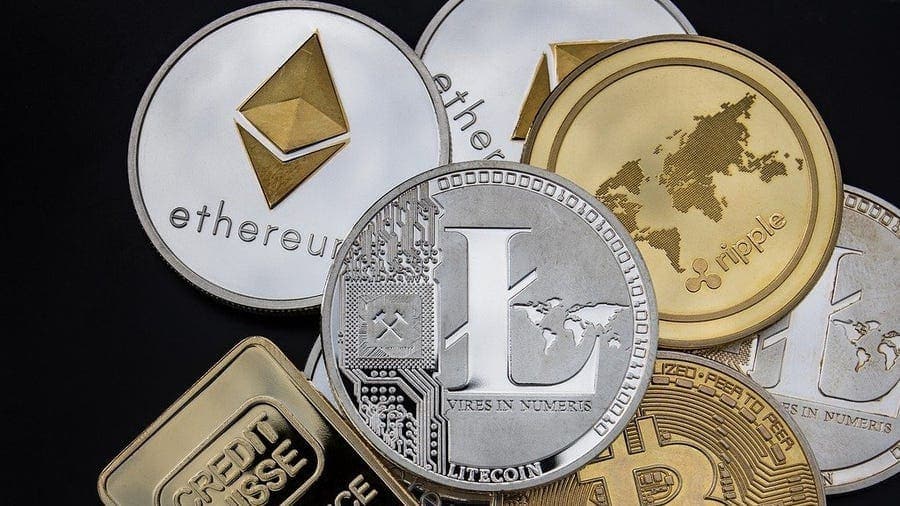
Crypto wallets are necessary for purchasing, trading, and selling cryptocurrency. Traders require them to securely store cryptocurrency as well as to preserve and validate transaction data. Custom crypto wallets, whether hardware or software, also known as hot and cold crypto storage, provide traders with more personalised alternatives than crypto exchanges.
Coinbase Wallet
PROS
User-friendly UI that is simple to use
More than 5,500 digital items are supported.
Support for multi-signature and two-factor authentication
Supported by a reliable trading platform capable of recovering lost or stolen assets
CONS
Other hot storage options have similar security risks and flaws.
Only mobile and tablet devices are supported (except for Chrome extension)
Why we selected it: We chose Coinbase Wallet as the best crypto wallet for beginners because it is an easy-to-use and safe wallet that is backed by a well-known exchange.
Coinbase Wallet is a fantastic wallet for those who are new to cryptocurrency. The software links to the majority of major bank accounts, and the user experience was meant to be straightforward and simple to use, with a basic three-tab structure and easily recognized functionality.
Coinbase Wallet can store prominent coins such as Bitcoin, Litecoin, Dogecoin, and Ripple, as well as all ERC-20 tokens and tokens on EVM-compatible blockchains, for a total of more than 5,500 supported digital assets, making it one of the most comprehensive on our list.
It’s critical to distinguish between the Coinbase exchange and the Coinbase wallet. The Coinbase exchange is one of the most established and well-known crypto trading platforms in the United States. Keeping your digital assets on the exchange’s web wallet makes trading easier, but it exposes your coins to more hazardous cybersecurity risks.
The Coinbase wallet may be used without creating an account with the exchange, and it is non-custodial, which means the private key is held on your device rather than on Coinbase’s servers. This means you don’t have to be concerned about your currencies being frozen for any reason or being vulnerable to a cyberattack on the website.
Metamask
PROS
User-friendly interface design for browser extensions and apps
May be linked to NFT exchanges
Thousands of dApps are supported.
CONS
Purchase fees Ether has a significant volatility.
Bitcoin cannot be directly stored.
Why we chose it: We picked MetaMask as the best Ethereum crypto wallet because its user-friendly design allows quick and simple access to hundreds of currencies and decentralised apps on the Ethereum network.
With over 30 million monthly active users, MetaMask is one of the most popular Ethereum wallets. This might be owing to its simplicity and accessibility: The wallet is appealing and simple to use for new investors who want to store and transmit Ethereum-compatible currency and connect with decentralised apps (dApps).
MetaMask’s interoperability with various blockchain systems is also noteworthy. Almost any blockchain network may be added to the app by users. Popular Web3 networks, such as Polygon, Binance Smart Chain, and Avalanche, are fully supported by the wallet. Users may also use the wallet to visit popular NFT markets like OpenSea and exchange a variety of items.
Anybody who uses Google Chrome, Microsoft Edge, Mozilla Firefox, or Brave can install the wallet as an extension. You may also get the MetaMask app for your Android or IOS smartphone.
Trust Wallet
PROS
Accepts a wide variety of money and tokens
Get interested in one of twelve different cryptocurrencies.
Interface that is simple and straightforward to utilise
Web3 browser is pre-installed.
CONS
Binance, which has had regulatory troubles in the United States, owns the company.
There are few educational resources on coins and tokens.
Why we selected it: Trust Wallet was chosen as the best crypto wallet for mobile because it has the cleanest, scannable user interface, built-in support for dApps and NFTs, and the most supported assets on our list.
Trust Wallet is a popular mobile online crypto wallet as well as the official mobile app of Binance, one of the world’s largest cryptocurrency exchanges. Despite its connections to Binance, the wallet is non-custodial, which means it does not hold your private keys and you are responsible for keeping them safe. It supports over 65 blockchains, which allows it to hold a diverse range of digital assets — over 4.5 million coins and tokens, the most on our list.
Trust Wallet is also a wonderful mobile choice for those interested in NFT and decentralised apps. The wallet includes a Web3 browser that allows users to access dApps and blockchain games straight from the app. This feature simplifies the process of purchasing NFTs by allowing users to search for, purchase, and store tokens utilising the integrated decentralised exchange without leaving the app.
Ledger Nano S Plus
PROS
Install up to 100 applications at once.
Purchase and trade cryptocurrency immediately from the Ledger Live app.
Validate all transactions by pressing two buttons.
Compatible with over 50 different hardware wallets
CONS
More costly than the initial entry-level wallet
The proprietary operating system is not open source.
Why we selected it: We chose the Ledger Nano S Plus as the best crypto hardware wallet due to its wide range of supported assets, strong security architecture, and trading possibilities via the integrated Ledger Live app.
Ledger is a well-known brand in the cryptocurrency industry, offering hardware wallets that are popular among crypto aficionados. Its products are distinguished by the use of a Secure Element component — a sort of chip often used on passports, credit cards, and payment systems — to add an extra degree of protection.
Its initial wallet, the Nano S, was updated to the Nano S Plus in April 2022, with a better display, significantly increased storage space, and a USB-C cable connector. When contrasted to its bigger sibling, the Ledger Nano X, this improvement to the Ledger Nano S makes an already outstanding entry-level product much more appealing.
The wallet costs $86.98, a reasonable price that falls nicely between the cheaper and more costly choices on the market today. Furthermore, it is 2.2 0.7 0.36 inches in size and has a 128 by 64-pixel screen, making it easy to carry around and cycle through your loaded programs.
Electrum
PROS
Quick and simple to set up
More secure than other hot wallets
Transaction costs that can be customised
Because of server setups, wallets do not experience downtime.
CONS
The setup and interface are not suitable for novices.
There is no customer service by chat, email, or phone.
Why we chose it: We picked Electrum as the best Bitcoin wallet because of its extensive security features and high level of customizability.
Electrum, which was founded in 2011, is one of the oldest and most well-known crypto wallets today. It’s also one of the few surviving crypto wallets that solely accept Bitcoin, a currency that Electrum is specifically designed to serve.
The wallet has a number of strong security features, including 2FA, transaction proof verification, and multi-signature wallet compatibility. Moreover, customers can customise their costs based on how long they are ready to wait for a transaction to be completed: Spend more in fees, and your transaction will be completed more quickly.
One of the wallet’s most valuable features is that it employs a lightweight client. Lite clients may be set up in minutes and take up less space on your computer than regular wallet clients. The wallet only downloads sections of the blockchain when utilising simple payment verification (SPV), which speeds up transactions without compromising security.
Blue Wallet
PROS
Contemporary design with an easy-to-use user interface
Allows for both on-chain and lightning transactions.
Several wallets can be created or imported.
Vaults with multiple signatures for enhanced security
CONS
There is no two-factor authentication.
Advanced tools may benefit from in-app lessons.
Why we chose it: We selected BlueWallet as the best bitcoin wallet for mobile because of its feature-rich mobile software, intuitive user interface, and Lightning Network support.
BlueWallet is an ideal choice for Bitcoin traders who are unable or unable to use more complicated applications on their desktop PCs. It’s similar to Electrum in that they are both bitcoin-only wallets, which means they can focus entirely on innovating and improving the Bitcoin experience on the platform.
The wallet’s UI is friendly and simple to use for novices, but the software also provides a lot of complex features that expert users may appreciate. BlueWallet allows users to conduct batch transactions, modify fees, and create a Tor connection for greater anonymity in addition to basic features such as sending, receiving, and storing BTC.
Another significant feature of BlueWallet is its connection with the Lighting Network, a layer two solution that speeds up peer-to-peer payments far quicker than bitcoin’s layer one network. Consider the Lightning Network to be an expressway built on top of the conventional Bitcoin network.
Exodus
PROS
Supports over 260 cryptocurrencies.
Trezor One and Trezor T hardware wallets are supported.
Enables consumers to purchase Bitcoin with Apple Pay and has 24-hour customer service.
CONS
High transaction fees on the crypto exchange within the wallet
Some users may be bothered by the lack of native two-factor authentication.
There is no support for multiple signatures.
Why we chose it: Exodus was chosen as the best crypto wallet for desktops due to the speed of its transactions, ease of use, and the diverse features of its client.
Exodus is one of the most graphically stunning and user-friendly wallets available. Exodus was originally a desktop-only wallet, but it now offers iOS and Android applications and is compatible with Trezor wallets, a prominent hardware wallet manufacturer. Nevertheless, the desktop wallet program, which is available for Windows, Linux, and Mac, remains the wallet’s main product and is updated every two weeks.
Exodus’ key selling point is the quantity of currencies it supports: over 260 crypto and NFTs, which is more than many other hot wallets. This contains both well-known altcoins like Ether, Litecoin, XRP, and Bitcoin Cash, as well as famous meme currencies like Dogecoin and Shiba Inu.
The wallet also includes an increasing number of applications that are being developed to expand the wallet’s capabilities, such as apps for live charting, crypto staking, and crypto deposits.
com
PROS
Choose your desired trade charge and confirmation speed.
Around 250 currencies are supported, including BTC, ETH, CRO, ATOM, DOT, and LTC.
Get interested in over 21 different cryptocurrencies.
CONS
If you lose your private key and recovery phrase, you will be unable to access your funds.
Geo-restrictions apply to the built-in token swap.
Why we selected it: We chose Crypto.com as the best DeFi crypto wallet due to its wide range of decentralised financial solutions, smooth onboarding procedure, and robust security architecture.
The Crypto.com DeFi Wallet is an ideal solution for those who are just starting out in the world of decentralised finance. Users have total control over their digital assets and private key, which they are responsible for keeping safe. This form of wallet also contains capabilities that normal, custodial wallets do not have, such as one-to-one coin exchanges and a variety of tools for users to make passive income on the crypto they currently hold.
It’s vital to distinguish between custodial and non-custodial wallets on this exchange, as it is on others. You may use the Crypto.com DeFi Wallet for day-to-day crypto operations without creating an account on Crypto.com’s trading platform.
Consumers should be warned that decentralised finance goods and services are fraught with danger and should be used with caution.
Why do I need a crypto wallet?
Cryptocurrency wallets, also known as crypto wallets, are locations where traders keep the secure digital codes required to communicate with a blockchain. Despite what their name suggests, they do not actively store your bitcoins.
Crypto wallets must connect with the blockchain in order to locate the cryptocurrency linked with your address. In actuality, crypto wallets are ledgers that serve as an owner’s identification and account on a blockchain network, as well as providing access to transaction history.
What kind of crypto wallets are there?
Crypto wallets are divided into two types: hot wallets and cold wallets. The major distinction is that hot wallets are constantly online, whereas cold wallets are kept offline.
Hot Wallets
Hot wallets are digital instruments that cannot be disconnected from the internet. Users may monitor and trade their currencies using these pieces of software from their phone or desktop computer. Several hot wallets may also be accessed through the web or as browser extensions, allowing you to utilise them on a broad range of devices.
The main benefit of hot wallets is their portability. Your public and private keys are saved and encrypted on the app or website associated with your wallet, so you can access them from any device that has an internet connection. Because of their ease of use, they are great for people who trade frequently and are contemplating spending bitcoins.
Because hot wallets are continually available online, they are also more vulnerable to hackers. Hackers can hack into the system by exploiting hidden weaknesses in the software that supports your wallet or by using malware. This is especially problematic for online wallets hosted by cryptocurrency exchanges, which are larger targets for crypto criminals overall.
Cold wallets
Cold wallets save your digital keys offline on hardware or a sheet of paper. Hardware wallets are often in the form of a USB drive that allows you to purchase, sell, and exchange cryptocurrency while connected to a computer. Your keys may be available via print-out QR codes, printed on a sheet of paper, or etched on another material, such as metal, using “paper” wallets.
Cold storage wallets are purposefully designed to be difficult to hack. Hackers cannot remotely get the wallet owner’s keys unless the wallet owner falls victim to a phishing attempt.
Because of the high degree of security, wallet owners may make mistakes. If you lose your USB drive or piece of paper and don’t have a backup of your private key, you’ve basically lost access to your crypto. In contrast to hot wallets, which allow access through a seed phrase, regaining access to a cold wallet is very hard in most circumstances owing to the two-key security method.
What is the safest type of crypto wallet?
ZenGo-By removing the private key vulnerability, it is the most secure non-custodial wallet in Web3, making it the easiest but most secure wallet to invest in bitcoin. Establish an account in under 60 seconds and become the genuine owner of your cryptocurrency.
ZenGo is the first Web3 wallet that uses encrypted biometrics to protect its private keys. While this technology has been utilised by billion-dollar organisations for years, ZenGo is the first crypto wallet to include these sophisticated security features. Because of private key mishandling, millions of dollars in NFTs have been lost or stolen. ZenGo’s wallet eliminates the major weakness that leads to NFT theft, which is a hacker’s worst nightmare.
ZenGo provides real-time in-app customer care and supports more than 70 assets, including Bitcoin, Ethereum, and Tezos.
Because of ZenGo’s superior security, hackers will have a tough time accessing your wallet. When you join up, you’ll be required to utilise 3FA security. Following that, you must confirm your registration by clicking the link in your email. When you finish those procedures, your decryption code will be kept on your cloud storage. Next, you must configure your encrypted biometrics. This wallet is also incredibly safe since it employs MPC-based cryptographic technology. They have also incorporated “Cold StorageTM,” a guaranteed access option that allows you to retrieve your cash in severe circumstances.
What is the most convenient way to store cryptocurrency?
The safest techniques for storing your keys and protecting your bitcoin will always be those that you manage yourself without a connection to the internet.
Will my Bitcoin grow in my wallet?
Absolutely, your bitcoin will increase while it is held in your wallet. The wallet is only a point of entry.
Conclusion
Bitcoin is not losing favour among users or criminals. Because there are individuals who would rather steal from others than work, it is critical to keep your bitcoin keys as secure as possible. Cold storage techniques are the safest way to keep your keys, but you will need to connect your storage device or input your keys at some time in order to utilise your bitcoin. The easiest approach to prevent hackers from stealing your crypto is to use an offline device just when you need to access and utilise your keys, then store the device in a secure location.
Related Posts

Cryptocurrency Is Risky. 7 Things Every Crypto Investor Be Awareadmin . January 19, 2022

Navigating the Process: A Thorough Manual for Converting Your IRAadmin . August 16, 2023

Top 12 Tips to Make Your Cryptocurrency Investment Secureadmin . April 24, 2023

Jim Cramer Advises Investors To Avoid Crypto Or Other Speculativeadmin . September 15, 2022

Top Artificial Intelligence Stocks Canada 2024admin . February 20, 2024

Top 12 Crypto Passive Income Strategyadmin . April 24, 2023

Why Investing in Mutual Funds Can Be a Smarter Choiceadmin . August 8, 2023

Over 70% Of Crypto Investors Believe They Can Become Billionaires:admin . October 10, 2022

Top 12 Cryptocurrency for Investment in India 2023admin . April 24, 2023
Latest Posts

Exploring the Best Cash Advance Apps of 2024 April 8, 2024

Top 34 Passive Income Ideas in 2024 March 19, 2024

Top 10 Penny Stocks to Buy Canada 2024 February 23, 2024

Best Canadian Artificial intelligence stocks under $1 2024 February 23, 2024

Top Artificial Intelligence Stocks Canada 2024 February 20, 2024

